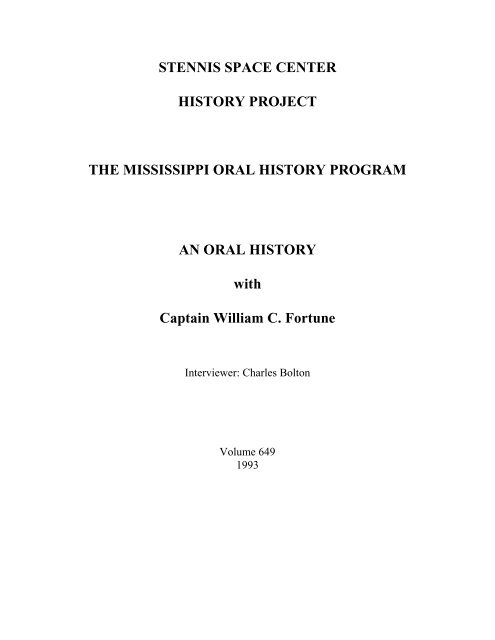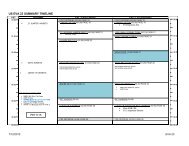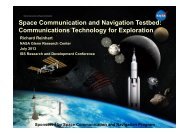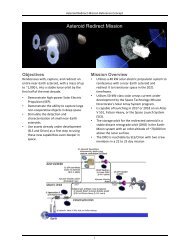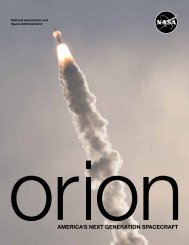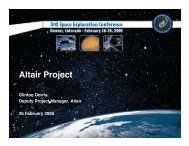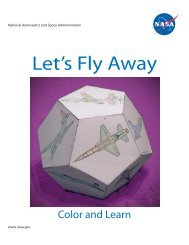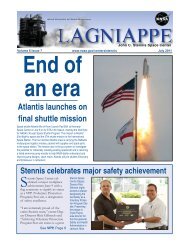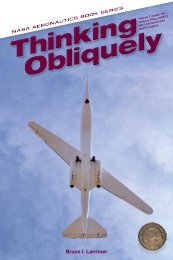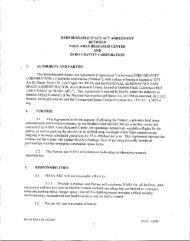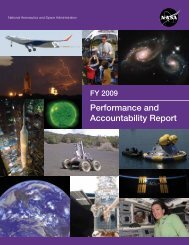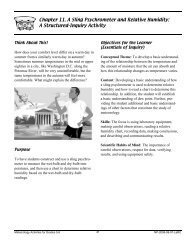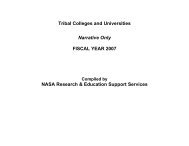William Fortune - NASA
William Fortune - NASA
William Fortune - NASA
You also want an ePaper? Increase the reach of your titles
YUMPU automatically turns print PDFs into web optimized ePapers that Google loves.
STENNIS SPACE CENTER<br />
HISTORY PROJECT<br />
THE MISSISSIPPI ORAL HISTORY PROGRAM<br />
AN ORAL HISTORY<br />
with<br />
Captain <strong>William</strong> C. <strong>Fortune</strong><br />
Interviewer: Charles Bolton<br />
Volume 649<br />
1993
©1996<br />
The University of Southern Mississippi<br />
This transcription of an oral history by the Center for Oral History and Cultural Heritage of The University of<br />
Southern Mississippi may not be reproduced or published in any form except that quotation of short excerpts of<br />
unrestricted transcripts and the associated tape recordings is permissible providing written consent is obtained<br />
from the Center for Oral History and Cultural Heritage. When literary rights have been retained by the<br />
interviewee, written permission must be obtained from both the interviewee and the Center for Oral History and<br />
Cultural Heritage.<br />
This oral history is a transcript of a taped conversation. The transcript was edited and punctuation added for<br />
readability and clarity. People who were interviewed may review the transcript before publication and are<br />
allowed to delete comments they made and to correct factual errors. Additions to the original test are shown in<br />
the brackets [ ]. Minor deletions are not noted. Original tapes and transcripts are on deposit in the McCain<br />
Library and Archives on the campus of The University of Southern Mississippi.<br />
Charles Bolton, director<br />
Center for Oral History and Cultural Heritage<br />
Southern Station Box 5175<br />
Hattiesburg, MS 39406-5175<br />
(601) 266-4574<br />
An Oral History with Captain <strong>William</strong> C. <strong>Fortune</strong>, Volume 649<br />
Interviewer: Charles Bolton<br />
Editor: Shana Walton<br />
Typist: Marie Sykes
Biography<br />
<strong>William</strong> C. <strong>Fortune</strong> was born March 1, 1911, in Salamanca, New York, on a Seneca<br />
Indian reservation, to Archibald <strong>William</strong> <strong>Fortune</strong> (a high school principal at the time) and Amy<br />
Hardendorf <strong>Fortune</strong> (a teacher). His father was later to become a Superintendent of Schools and<br />
his mother Town Clerk of Morristown, NY. Capt. <strong>Fortune</strong> graduated as valedictorian in 1929<br />
from Messina High School and received a score of 100 in geometry on the New York Regents<br />
High School Exam. He was nominated to the U.S. Naval Academy by Congressman Bertram<br />
Snell of New York (Republican). While at the U.S. Naval Academy in Annapolis, MD, he earned<br />
an “N” in soccer, “NA” in boxing and gym and graduated in the top 25% of his class. As an<br />
ensign he served aboard the Texas for two and a half years. After flight training at Pensacola, FL,<br />
1936-37, he was assigned to squadrons aboard the USS Saratoga, Ranger and San Francisco. He<br />
attended graduate school and was awarded an M.S. in aeronautical engineering from M.I.T. in<br />
1942.<br />
He served on Staffs of Commander Fleet Air, Japan, during the Korean incident; awarded<br />
Commendation Medal and ribbon both theaters. He was chief engineer at the Naval Aircraft<br />
Factory, 1946-48, and had various research and assignments including Bureau of Aeronautics<br />
Representative, Pasadena, CA; Aerodynamics Laboratory, David Taylor Model Basin; Air<br />
Branch, Office of Naval Research, BUAER General representative, Western District; Component<br />
Development Officer (directing Power Plants, Avionics and Airborne Equipment Division) in<br />
BUAER in Washington, D.C. He reported to the U.S. Naval Air Test Facility (ship installations)<br />
at NAS Lakehurst, NJ, in July, 1959, as commanding officer, serving until September 12, 1962.<br />
He was one of the few senior aeronautical engineering officers qualified in jet aircraft and held a<br />
commercial pilot’s license with instrument rating. Although he has had mid-air collisions, bailed<br />
out, been in forced landings, fired at and flown through a cable trap over Korea, he says he was<br />
more worried on a free-balloon flight that had valve trouble and came down hard near Lakehurst,<br />
NJ. He does not advocate flying in a wicker basket.<br />
From his Lakehurst assignment, Capt. <strong>Fortune</strong> was personally requested by Werner von<br />
Braun to build the test site for the Apollo moon rockets. He first went to Huntsville, AL, to work<br />
with Dr. von Braun and <strong>NASA</strong> associates before moving to Mississippi in 1963 to develop the<br />
test site in Hancock County. The test site was developed out of a wilderness area and eliminated<br />
two towns. Today, the test site is known as Stennis Center.<br />
Capt. <strong>Fortune</strong> moved to Palos Verdes Estates, CA, in 1965 and retired in 1972 from<br />
<strong>NASA</strong>. His wife of almost 60 years, Elizabeth (“Libby”) Offutt <strong>Fortune</strong> of Bethesda, MD, died<br />
on January 9, 1995. His daughter Amy Elaine <strong>Fortune</strong> Valkass died in 1979. His other two<br />
daughters, Wealtha <strong>Fortune</strong> Weaver and Laurie <strong>Fortune</strong> Jaffe, who live in California, both<br />
graduated from the University of Southern Mississippi. His granddaughter, Sande Lea Weaver, is<br />
currently an accounting senior at Southern and plans to attend graduate school at USM.<br />
Among societies and memberships held, honors and publications include: <strong>NASA</strong> 40 Year<br />
Service Award Certificate; <strong>NASA</strong> Apollo Achievement Award; George C. Marshall Space Flight
Center (<strong>NASA</strong>); Associate Fellow in the Institute of Aerospace Science; American Rocket<br />
Society, Director of So. California Section and charter member of first board of directors; <strong>NASA</strong>,<br />
George C. Marshall Space Flight Center in Recognition of Contribution to Technology<br />
Utilization Program; Technology Utilization Award, Outstanding Achievement; 25 Years<br />
American Institute of Aeronautics and Astronautics, in Appreciation for Sustained Contributions<br />
since 1947; NATO Committees; U.S. Pacific Fleet Flagship of the Commander in Chief; Jet<br />
Training Certification; National Council, Mason and Shriner; NACA and AGARD Committees;<br />
authored various articles in Technical Journals on Aerodynamics, Propulsion, Engineering,<br />
Careers in Civil Service, VTOL, Launching and Arresting Devices, Material Reliability, etc.<br />
Among other honors received include: Navy League of Jersey Shore Council, Palos Verdes<br />
Estates, and National Navy League; many citations from governors and senators of the state of<br />
Mississippi, coordinator of the State of Mississippi Research and Development Council, 1964-<br />
1968; Pass Christian Chamber of Commerce; citations and certifications from the secretary of the<br />
Navy and Department of the Navy; and <strong>NASA</strong> commendations from Wernher von Braun.
AN ORAL HISTORY<br />
with<br />
CAPTAIN WILLIAM FORTUNE<br />
This is an interview for the Stennis Space Center History Project in conjunction with the<br />
Mississippi Oral History Program. The interview is being conducted with Captain <strong>William</strong><br />
<strong>Fortune</strong> by telephone. Captain <strong>Fortune</strong> currently lives in California. The date is September 16,<br />
1993, and the interviewer is Charles Bolton, program director.<br />
Bolton: OK, the first question. I just wanted to ask you when and where you were born?<br />
<strong>Fortune</strong>: Well, I was born in Salamanca, New York, on a Cattaraugus Indian reservation [on<br />
March 1, 1911].<br />
Bolton: Oh, really?<br />
<strong>Fortune</strong>: Which is why I always say I can see so far.<br />
Bolton: Why were you born on an Indian reservation?<br />
<strong>Fortune</strong>: In 1911, March 1.<br />
Bolton: OK. Why were you born on an Indian reservation?<br />
<strong>Fortune</strong>: My mother was teaching school there in Salamanca and that was on the Cattaraugus<br />
Indian reservation. [My father was the high school principal and then superintendent of schools.<br />
My aunt, Mrs. T.S. Bell was commissioner of Indian Affairs.]<br />
Bolton: OK. I know that you—<br />
<strong>Fortune</strong>: A Seneca reservation by the way, one of the Seneca tribes.<br />
Bolton: OK. I know that you eventually became a pilot and got—<br />
<strong>Fortune</strong>: After initial three years aboard the Texas—I became an honorary son of Texas by the<br />
way by serving aboard the U.S.S. Texas, from graduation [from the Naval Academy] to going to<br />
Pensacola [for flight training].<br />
Bolton: OK. Were you interested in flying when you were a kid? Had you always been fascinated<br />
with flying, or how did you get interested in that?
3<br />
<strong>Fortune</strong>: I had an uncle in World War I who always kept trying to get me flying. He took me<br />
flying early, before I ever went to the Naval Academy.<br />
Bolton: OK. So you went to the Naval Academy then?<br />
<strong>Fortune</strong>: I went to the Naval Academy in 1929 and graduated in 1933. I was assigned to the<br />
U.S.S. Texas as a junior deck officer, served in [aircraft gunnery observation] battle control, and<br />
damage control, all the different departments.<br />
OK. I was married, by the way, before—[the Navy wouldn’t let Naval Academy graduates<br />
get] married for the first two years [after graduation]. That was during the Depression. Well, as<br />
soon as I could, I got married on June 7 of 1930, let's see, 193—when were we married, Lib?<br />
Mrs. Weaver: June 7, 1935.<br />
<strong>Fortune</strong>: Married June 7, 1935.<br />
Bolton: She's going to get you for not remembering that. What kind of planes would you be flying<br />
back in the ’30s?<br />
<strong>Fortune</strong>: When I started out, I was a naval gunnery observer in an old 02-U, an observation plane.<br />
I was observing the gunnery practices [and how far they were off target]. That was about after a<br />
year or so. And then I really wanted to fly and went to Pensacola. And in two and a half or three<br />
years, took about a year in Pensacola, and then was assigned to a VS squadron, a Victor-S, a long<br />
range spotting for the ships. [I also flew dive bombers and over the years, each new airplane as it<br />
was made and used, including jet aircraft.]<br />
Bolton: Well, about the time you got your wings would be, I guess, World War II was just on<br />
the horizon. What were you doing during the war?<br />
<strong>Fortune</strong>: I was actually flying from '35 until '39. I was assigned back to the Navy post graduate<br />
school in Annapolis. And after two years in a post graduate school at Annapolis, then I was assigned<br />
to MIT [Massachusetts Institute of Technology] for the subsequent scholastic year. [After graduating<br />
with an MS in aeronautical engineering,] from MIT, I was directly assigned to the naval aircraft factory,<br />
Philadelphia.
4<br />
Bolton: And that was where they were building naval aircraft?<br />
<strong>Fortune</strong>: We were building aircraft trainers and equipping all the carrier airplanes with hooks<br />
for catapulting and tailhooks for arresting. Catapult hooks for catapulting and tailhooks for<br />
arresting gear.<br />
Bolton: And this would have been during World War II, right?<br />
<strong>Fortune</strong>: Oh, yes, it was right just about the beginning.<br />
Bolton: So, the pace must have been hectic, I imagine.<br />
<strong>Fortune</strong>: We not only tested all Navy aircraft, including seaplanes and land planes, but Army<br />
and Air Force. At the time, of course, it was just Army and then the Army Air Corps and then the<br />
Air Force. Whenever those other services wanted to go to be launched, to go in fighting—in<br />
other words, we could launch them from the deck of a carrier with the catapult. And I had to train<br />
in Philadelphia to get them used to catapulting before we would let them go out on the carriers to<br />
be launched.<br />
Bolton: Did you stay there for most of the war? Is that where you were located throughout<br />
World War II?<br />
<strong>Fortune</strong>: I'm trying to think where we went from Philadelphia. No, I came out to ComAirPac,<br />
was assigned to the Commander Air Forces Pacific fleet in Pearl Harbor, on Ford Island in Pearl<br />
Harbor. And I spent two years and a half there, checking all the carriers, making sure they were<br />
properly tested before going out to combat, or I had to repair those that were shot up or worn out<br />
or damaged and so on.<br />
Bolton: So you had a lot of experience in the testing aspect of—<br />
<strong>Fortune</strong>: Yes, I did, a great deal. From that I went back to Philadelphia. I continued more of it. I<br />
got an excellent fitness report from the fleet for all my work at Ford Island, and then I kept on. I<br />
was assigned to the staffs of ComAirPac again, testing and continuing checking everything with<br />
the fleet again. So I alternated, really, between Philadelphia and mostly in the different fleet jobs<br />
for about several years. Then I was taken out to the Pacific to work for Admiral Pearson, who<br />
had been my boss in Philadelphia the last year or two. And I went with him to Commander Air<br />
Forces Pacific fleet. Then I worked with all the different aircraft suppliers, providers aircraft<br />
companies. Then at San Diego and down here in Santa Monica, all around the West Coast.<br />
Bolton: Right. A lot of them were located on the West Coast then.
<strong>Fortune</strong>: And then I had a Naval Air Test Facility, Lakehurst — not the lighter-than-air, but we<br />
closed out — we took over from the LTA, the lighter-than-air, the “poopey packers” as we called<br />
them.<br />
Bolton: This was in New Jersey? Lakehurst in New Jersey?<br />
<strong>Fortune</strong>: Right. And we became the primary test facility for new aircraft, new planes, new<br />
devices and so forth. And it was there that—when [Wernher] von Braun came to the states, as I<br />
say, I had met him as a member of the state department team to go over and advise the Germans<br />
on what they could do for military research and development.<br />
Bolton: And this is after the war?<br />
<strong>Fortune</strong>: Yes.<br />
Bolton: OK.<br />
<strong>Fortune</strong>: When the treaty of—let's see, how many years was the Treaty of Ghent after World<br />
War II? I think it was seven years after the war.<br />
Bolton: OK.<br />
<strong>Fortune</strong>: The Treaty of Ghent expired. I went as a representative of the aircraft side of the Navy,<br />
and [another] man from [N.O.T.S. (Naval Ordinance Test Station)], the chief scientist from<br />
N.O.T.S., advised them on all the gunnery and explosives techniques.<br />
Bolton: This is still when von Braun is in Germany, right?<br />
<strong>Fortune</strong>: Yes, that's when I met him over there the first time.<br />
Bolton: What was your first impression of him? What did you think of Braun the first time you<br />
met him?<br />
<strong>Fortune</strong>: Really, he seemed fairly quiet. He hadn't been happy with the Nazis; I could tell that<br />
right away. He didn't like the way that things had been going, and he was straining to get away<br />
from restrictions and military limitations. It wasn't until after I had worked with him as a<br />
manager—I managed the naval air—let me see now, what did I do for von Braun? I went to—<br />
where was von Braun? I'm trying to think.<br />
Bolton: I don't know if this—but I read somewhere that you were with the Navy when they were<br />
doing the shipboard launches of the V-2 rockets just after the war.<br />
5
6<br />
<strong>Fortune</strong>: Oh, that's right I did that, too. I designed the launch equipment for the V-2. I guess<br />
that's probably the first time I had really been closer to von Braun.<br />
Bolton: That was in '47, from what I've read.<br />
<strong>Fortune</strong>: Yes. And when I went to work with him, directly, I was always impressed. He had<br />
about thirty different managers. I managed the design and construction of<br />
the Mississippi Test Facility for moon rockets. And he would call us around every two to four<br />
weeks, get all the thirty managers in. He would very succinctly outline the problems that we were<br />
facing each week in the different sections and areas of his command. Then, he would ask each of<br />
the managers, “Well, now what would you recommend for these problems?” And he would then<br />
sound off each one. Most of it, I would keep my mouth shut except to tell him what the problems<br />
were in the launching and the rockets problems.<br />
Bolton: So, were you still with the Navy when you working with von Braun?<br />
<strong>Fortune</strong>: I was told I could consider myself on loan to von Braun.<br />
Bolton: OK. So you were with the Navy, but you were part of his team that was trying to<br />
develop the rocket program.<br />
<strong>Fortune</strong>: Right.<br />
Bolton: OK.<br />
<strong>Fortune</strong>: In fact, he even wrote my fitness reports. I got some very nice ones from him. Then<br />
after each manager had said what they would do in their particular forté he would say, “Well,<br />
that's fine. You've contributed greatly now. Now here's the way we're going to do it.” (laughter)<br />
Bolton: (laughter) He had his own ideas in other words.<br />
<strong>Fortune</strong>: He'd come up with far better solutions than a lot of the people in the field did. He had<br />
a real beautiful way of analyzing.<br />
Bolton: Who were some of the other people on that team that you worked with that you<br />
remember?<br />
<strong>Fortune</strong>: Heimburg was in charge of testing, per se, right at Huntsville. And I worked closely<br />
with him, down trying to learn as much of their ideas of testing and so forth as I could. And I've<br />
got to go back. I should have done this, and I meant to tell you the outstanding Germans that I<br />
met. And they were a wonderful crowd.<br />
Bolton: How did, for instance, Heimburg differ from von Braun? Was there a difference there?
7<br />
<strong>Fortune</strong>: Well, Wernher had a way of summarizing the different suggestions made. Heimburg<br />
would say, “Now, we'll do it this way, my way.” He was a hard-headed German tester. There's<br />
no question about it: he was brilliant, but he wasn't always right. But as far as I know von Braun<br />
was never wrong. (laughter) It was a very enlightening experience.<br />
Bolton: So, did you eventually go to Huntsville to work because the team was based in<br />
Huntsville—is that right?—at this time?<br />
<strong>Fortune</strong>: Yes, right. Yes, I spent quite a bit of time in Huntsville and then at their different<br />
locations.<br />
Bolton: OK. How did it come to be that you were chosen as the manager for the Mississippi<br />
Test Facility?<br />
<strong>Fortune</strong>: Oh, he came to visit me in Lakehurst one time. He said, “Bill, you've got the same<br />
problems facing you. We're in a remote area. The people around here are in the boondocks, out in<br />
the woods, so to speak, many of whom have never been three miles or more from home. They<br />
have to be brought up and educated to what we're doing. They've got to be shown that what we're<br />
doing is not hazardous, it's not dangerous, but it is necessary for us to get to the moon.” One old<br />
lady said, “Well, why do you want to spend all your time dashing madly around the country?<br />
Why don't you just sit home and watch television?”<br />
Bolton: This is somebody in Mississippi said that?<br />
<strong>Fortune</strong>: Some old lady in—well, first I heard it down in Huntsville.Bolton: Oh, OK.<br />
<strong>Fortune</strong>: And then I heard it at Lakehurst, somebody else. They'd always come out, “Well, why<br />
do you want to do this? Why should we go to the moon? Why can't we just sit here and watch it<br />
on TV?” And he would very patiently explain, “Well now, you won't see it on television until<br />
we have perfected it, until we've been able to do so. And we have to get there in order to expand<br />
the man's knowledge of the cosmos, of the universe, and to go on to more heavenly targets or<br />
heavenly areas.” And he could explain to a six-year-old kid or a sixty-year-old lady and convince<br />
them. He was a real super salesman.<br />
Bolton: Did he have the idea that eventually that the testing of rockets was going to lead to<br />
exploration in space? I mean the American government didn't necessarily come around to that<br />
idea until the late ’50s, but he had this idea much earlier, didn't he?<br />
<strong>Fortune</strong>: Oh, the Germans had that at Peenemünde [Experimental Center] all along.<br />
Bolton: OK.
8<br />
<strong>Fortune</strong>: He brought many of his Peenemünde group with him. And that was in the back of<br />
their purposes and thoughts.<br />
Bolton: Do you think that the rocket program could have been ever completed without that<br />
expertise from the German scientists, or would it have been slowed down?<br />
<strong>Fortune</strong>: Well, I had my own rockets when I was in the Office of Naval Research. We'd had<br />
nothing that size.<br />
Bolton: So, the Germans were a little bit ahead of the Americans.<br />
<strong>Fortune</strong>: The Germans were ahead of us in large-size rockets. I launched the Aerobe, for<br />
example, from a seaplane tender, working with Point McGoo. And I worked with Point McGoo<br />
on several other projects, NAMC, the Naval Air Missile Center—the Naval Air Missile Test<br />
Center—NAMTC, I guess it's called, and worked with them all along. I had been interested in—I<br />
had met Dr. [Robert H.] Goddard, one of our foremost U.S. scientists who launched many small<br />
rockets for atmospheric tests.<br />
Bolton: Right. When did von Braun and his team and everyone realize that they were going to<br />
need to build a new test facility? How early did they start to realize that they were going to need<br />
a new test facility? It was built in the ’60s. I was just wondering if it was years before that, or did<br />
this come up all of a sudden that they needed a new test facility?<br />
<strong>Fortune</strong>: I'm trying to think of where I visited in Germany. Let me put it this way. The Germans<br />
were limited by the Treaty of Ghent. They could not supposedly do any military research and<br />
development in rocketry, but it just so happened they had packages that would carry three<br />
thousand pounds of mail. That's the way they developed their three-thousand-pound bomb.<br />
Bolton: Mail carriers.<br />
<strong>Fortune</strong>: Mail carriers.<br />
Bolton: OK.<br />
<strong>Fortune</strong>: And then they had sonar. Their underwater work was just beautifully—they had<br />
torpedoes that were faster than ours. They had underwater devices for seeing—oh, those are just<br />
for finding fish—and torpedoes, of course, and other submarines and stuff like that.<br />
Bolton: So, even though there were a number of German scientist, including von Braun, that<br />
came over to this country, y'all were still working with a lot of German scientists that were back<br />
in Germany. Is that right?<br />
<strong>Fortune</strong>: Yes, Peenemünde.
9<br />
Bolton: OK. When did you first go down to the Hancock County area where the test facility was<br />
going to be built? When you first went down there, what were your first impressions of the area?<br />
<strong>Fortune</strong>: We needed a barren, sparsely settled area. We had learned that the rocket firings for<br />
test purposes would shake buildings apart unless they were specially strengthened and designed.<br />
They learned that at Huntsville where they moved several—I remember walls. You could see the<br />
walls moving with all the vibration from the testing, the big motors and everything. And they<br />
realized that they couldn't do it at Huntsville. They had to have a remote, sparsely settled and<br />
specially designed.<br />
Bolton: OK. I know that there was some talk about a NOVA rocket at the time, too. Was that a<br />
consideration in looking for a bigger testing area, this NOVA rocket that there were plans for?<br />
<strong>Fortune</strong>: I'm trying to think when I was at White Sands. I visited White Sands frequently to keep<br />
up with progress there. NOVA was discussed. We had a national space study group. I remember<br />
having to make presentations to them for every time they wanted to develop a bigger step or a<br />
new fuel or a new propellant. [Rep. Les] Aspin was one of the more knowledgeable congressmen<br />
or senators that—let me see, when did I make presentations to him that time? He was one of the<br />
few people that would understand what I was talking about.<br />
Bolton: Was that a problem, convincing the political people that this rocket program was<br />
needed?<br />
<strong>Fortune</strong>: They did not perceive much of the necessity.<br />
Bolton: What do you think changed their mind, kind of made them realize this was important?<br />
<strong>Fortune</strong>: Well, when we launched the V-2 off the Midway was one of them. That was a great<br />
convincer for not only the congressional people, but a lot of the senior Navy people.<br />
Bolton: OK. Saw how powerful that could be.<br />
<strong>Fortune</strong>: Absolutely. And they all of a sudden realized that they had a bear by the tail.<br />
Bolton: Let me just ask a few things about when you got down to Mississippi, and when you<br />
were working as manager of MTF. How did the landowners, the ones that had to leave their<br />
homes and everything, how did they deal with—<br />
<strong>Fortune</strong>: They were very unhappy.<br />
Bolton: Very unhappy.
<strong>Fortune</strong>: They had to move them out. They had to find them places. The Army Corps of<br />
Engineers handled the land purchase and transfers and so on. And they had to learn, as we did, to<br />
go along. We were caught between the rednecks and the NAACP.<br />
Bolton: What do you mean by that?<br />
<strong>Fortune</strong>: Well, one day I had to escort my wife—oh, the governor of Mississippi had a very<br />
sharp, smart capable aide, a black man. I think he was a lieutenant colonel or something on the<br />
governor's staff.<br />
Bolton: There was a black man on the governor's staff at that point?<br />
<strong>Fortune</strong>: Yes.<br />
Bolton: OK.<br />
<strong>Fortune</strong>: A black man. That amazed me. He was a very polished gentleman, and he escorted my<br />
wife on several occasions took her to the—oh, we had NAACP lined up on one side of the street,<br />
all the rednecks, all the unhappy whites on the other because we were seeming—I had 66 percent<br />
of my working force, to start with in Mississippi, was black. And I hired the senior warden,<br />
inside a Baptist church, as our field supervisor to take care of all the problems with the blacks.<br />
And he kept them contended; he kept them happy; he kept them working.<br />
Bolton: Now, they wanted to make sure that they got their fair share of the jobs? Is that what<br />
the—<br />
<strong>Fortune</strong>: No. They were hard getting educated. Well, we killed seventy-eight poisonous snakes<br />
the first day.<br />
Bolton: Seventy-eight.<br />
<strong>Fortune</strong>: Seventy-eight.<br />
Bolton: This was your first day in Mississippi.<br />
<strong>Fortune</strong>: First day we started clearing the work area.<br />
Bolton: I'll bet the mosquitos were bad, too.<br />
<strong>Fortune</strong>: You know the Spanish moss in the trees?<br />
Bolton: Yes.<br />
10
<strong>Fortune</strong>: Oh, they were horrible. I mean the mosquitos hung in those things. We counted<br />
something like a hundred and sixty mosquitos a minute landing on the field etymologist's shirt.<br />
He had a square on his blouse that he used to count one square foot as to how many mosquitos<br />
would land per minute. And I say it was phenomenal. And they would get under their burnooses<br />
they wore—just like in a desert. They kept their faces wrapped, their neck, their sleeves, their<br />
arms, wore thick fabric in order to keep the mosquitos from stinging through them. It was a<br />
continuing battle, and at one time they were going to walk off the job. I called the Air Force. I<br />
had a good, excellent liaison with the Air Force down there in Mississippi. “Could you come<br />
spray this area here for us?” I'm trying to recall—a young man who'd been working with the<br />
governor, a very sharp individual, and I put him in charge of contacting the Air Force for me.<br />
They came right in. They sprayed for a hundred miles around, around the total perimeter of the<br />
Mississippi Test Facility.<br />
Bolton: Did that help?<br />
<strong>Fortune</strong>: It sure did. Then all of a sudden people realized that we could do something about<br />
mosquitos. They'd always just assumed that that was a natural burden that we had to bear. It was<br />
a wonderful, happy result. Oh, by the way there was nine different poisonous varieties of snakes,<br />
including the coral snake.<br />
Bolton: Which is very deadly.<br />
<strong>Fortune</strong>: The most deadly of them all.<br />
Bolton: Right.<br />
<strong>Fortune</strong>: But there were different kinds of diamond back rattlers, cane break rattlers, moccasins,<br />
both water, adders. We kept one exhibit in a cage for all the workers to see so they would know<br />
what the snakes were and which were poisonous and what to avoid and so forth.<br />
Bolton: It sounds like quite a job.<br />
<strong>Fortune</strong>: It never lost its interest at one accounting to another.<br />
Bolton: Just going back a little bit to the people that were there that you said were angry. How<br />
did you as the manager deal with trying to get them to accept what was happening?<br />
<strong>Fortune</strong>: It wasn't easy. For example we had one ward supervisor, Boogie Dean, and he was a<br />
boogie man. Not only did he scare all the blacks, but a lot of poor whites were afraid of him. And<br />
fortunately for me, Boogie had a sense of humor and could see the light after I would explain it.<br />
“Now, Boogie, this is the way we're going to have to do it.” Now, for example he built a lot of<br />
roads in there, and then looked to him like the Corps of Engineers wasn't going to pay him for<br />
them. And his roads were breaking down because of all the heavy earth movers and everything<br />
11
that was coming on going over them. And he'd come in and cry about them. I'd say, “Well now,<br />
Boogie, you just take it easy. I'll get you paid for that. It's going to take a bit of doing, but we'll do<br />
it. And another thing, if you don't do it my way, the way that this is going to get past all the<br />
politicos and the governor and so on. You won't get paid unless you do it the way where we can<br />
help you and us both at the same time. Boogie, I'll wrestle you for it, just to show you how<br />
serious I am.” He says, “Cap, I could throw you from here to Logtown ten miles away. However,<br />
you're the one guy I've talked to so far that seems to know what he's doing and does what he<br />
says.” And I said, “Thank you, Boogie. My God, it's been hard, but we got there.”<br />
Bolton: That's a good story.<br />
<strong>Fortune</strong>: I appreciated it.<br />
Bolton: Do you go out into the community to talk to other people in the community?<br />
<strong>Fortune</strong>: Oh, I made trips all around the state, up state, down state. We moved everything by<br />
water, you know. Barge and so on. And so I first learned all of the waterways and decided what<br />
we should do in order to get our big stages down from Huntsville into MTF and then from MTF<br />
over to the launch pad at Canaveral.<br />
Bolton: That sounds like public relations was a big part of your job, then, in those early days.<br />
<strong>Fortune</strong>: Oh, absolutely, completely.<br />
Bolton: OK. I know one of your first hires was Mack Herring as public relations officer. He said<br />
that you recruited him from Huntsville to come down to MTF.<br />
<strong>Fortune</strong>: Well, I went to Bart Slattery, who was the chief of that area, that division. “Bart,” I<br />
said, “it's going to take a very special guy to do this. And you know your people better than I do.<br />
Whom would you recommend?”<br />
Hmmm. “Mack Herring, I think, think has enough sense of reality and human elements<br />
on handle to handle people and convince them to get them to work together with you and with<br />
von Braun and so forth.” And he turned out to be a perfect help. You couldn't ask for anybody<br />
better. Even Bart Slattery said he was sorry to let him go.<br />
Bolton: His loss and your gain.<br />
<strong>Fortune</strong>: Right.<br />
Bolton: What was the most difficult problem that you faced in trying to actually turn this place<br />
from, basically, a wilderness into a viable test facility?<br />
12
<strong>Fortune</strong>: I had to get some of the Germans to realize they couldn't just tell another German what<br />
to do. They had to convince the poor backwoods people, the politicians, the local scientists<br />
around. They had to show them that they weren't going to be hurt by all the rumblings and the<br />
shakings, unusual events. One of my fortés with Wernher was that he sent some of the Germans<br />
up to Washington to <strong>NASA</strong> headquarters and so on, and they couldn't convince the people there<br />
that that was what they should. And I was just lucky that I had known a lot of these people before<br />
and worked with them, and they would listen to me. And that helped a great deal. And I also had<br />
a lot of good friends in<br />
industry that learned to work with—Gene Root, for example, from Lockheed was one of my<br />
helpers. Eugene Root, as it was.<br />
Bolton: Root, that's R-O—<br />
<strong>Fortune</strong>: R-O-O-T.<br />
Bolton: OK.<br />
<strong>Fortune</strong>: And I was lucky, Chuck, in that I had been first a BUAER [Bureau of Aeronautics]<br />
representative at AeroJet, and, in fact, I had many good friends at AeroJet. I launched an Aerobee<br />
off a ship in the Arctic.<br />
Bolton: Captain <strong>Fortune</strong>, let me interrupt a second. I need to turn the tape over.<br />
(Brief interruption. The interview continues on tape one, side two.)<br />
Bolton: Go right ahead.<br />
<strong>Fortune</strong>: Dan Kimball, who was one of AeroJet's vice presidents, always helped me. Whenever<br />
I had some sort of an industry or rocket problem and didn't know who to go to, I'd go to Dan or to<br />
Art Rude, his vice president.<br />
Bolton: So you were having to work with a lot of different people to bring this all together in<br />
other words.<br />
<strong>Fortune</strong>: Bill Gore, Al Gore's brother—well, Bill helped me convince a lot of the fleet on<br />
putting JATO, the Jet-Assist Take Off rockets on aircraft. And he even came down for me one<br />
time and put a rocket on to get a PBY [seaplane that had a forced landing] off the desert, to lift it<br />
off, because they couldn't take it off, you see, on the sand. And so they put a large enough JATO<br />
to get it into the air. Of course, once it was in the air, it was simple. And Bill, on another<br />
occasion, burned his tail off in some short fighter plane. And fortunately, it was close enough to<br />
the ground that he could get out safely because he would have been burned up if he had had to<br />
put it down as fast as it was going. So I've had a lot of help all along the way.<br />
13
14<br />
Bolton: Would you say that the job being the first manager of the MTF was a difficult job<br />
compared to other jobs that you had?<br />
<strong>Fortune</strong>: I say it's the most difficult job I ever had.<br />
Bolton: Oh, OK.<br />
<strong>Fortune</strong>: You never know where some new and unforeseen problem would come from, either<br />
political or personnel, different cults, different beliefs. I guess one of the lessons I had was at<br />
Lakehurst, and there were backward people there, some of whom were not complete educated.<br />
And trying to convince some people what is right is right takes a lot of persuasion and calm. You<br />
can't blow up. You have to explain and explain and explain. Finally, they begin to see the light.<br />
Those rednecks, they were something.<br />
Bolton: Could you see the place, over the time you were there, developing into something<br />
though from —<br />
<strong>Fortune</strong>: Oh, definitely. I hated to leave my headquarters down there. What did we call it?<br />
Bolton: The Rouchon House.<br />
<strong>Fortune</strong>: Paradise Lost.<br />
Bolton: Oh, OK. You were located in the Rouchon House right? Is that where your offices<br />
were?<br />
<strong>Fortune</strong>: Yes.<br />
Bolton: Paradise Lost.<br />
<strong>Fortune</strong>: Paradise Lost. And everytime, if I wasn't careful, I'd go out the front door to get a<br />
breath of fresh air or to see what was going on over there, and a boar would come charging at me<br />
with long tuskers. And I had to get something high to get up on or get up a tree or get behind<br />
something.<br />
Bolton: Did that happen to you frequently?<br />
<strong>Fortune</strong>: About once a day.<br />
Bolton: Really? I guess because people still ran their livestock on the open range.<br />
<strong>Fortune</strong>: They were still developing their little scrub cattle and their scrub farms. They were<br />
pretty primitive back in there.
15<br />
Bolton: Could you see a change come about in the local communities in the area because of the<br />
development of this facility?<br />
<strong>Fortune</strong>: Definitely. Their schools improved. And, incidentally, I worked with Mississippi<br />
[State University, Dr. Raspet].<br />
Bolton: This is while you were manager?<br />
<strong>Fortune</strong>: Yes, and before. I had worked with them, MSU, when I was at the naval aircraft<br />
factory. Now what was I doing? Why was I working with them? Oh, boundary layer control.<br />
Bolton: What's that?<br />
<strong>Fortune</strong>: Boundary layer control. A Mississippi State professor did a lot of primary studies and<br />
developed how the air flow over wings could be utilized to give greater lift or speed. And so—<br />
Bolton: Is this at Mississippi State or Mississippi Southern?<br />
<strong>Fortune</strong>: Mississippi State.<br />
Bolton: OK. So, you could see a lot of change come about in the communities over the time you<br />
were there?<br />
<strong>Fortune</strong>: Definitely. They learned how to develop, grow, and so forth.<br />
Bolton: Did you live in one of the communities in the area? Where did you live in the time you<br />
were working down at the Mississippi Test Facility? Did you live in Picayune or Slidell or the<br />
Gulf Coast?<br />
<strong>Fortune</strong>: Where did we live in Mississippi? What was the city, the town?<br />
Mrs. Weaver: Pass Christian.<br />
<strong>Fortune</strong>: You know, all of a sudden, I drew a blank. Pass Christian.<br />
Bolton: Pass Christian, OK. So down on the Gulf Coast.<br />
<strong>Fortune</strong>: Right.<br />
Bolton: OK.<br />
<strong>Fortune</strong>: A wonderful place.
16<br />
Bolton: OK. Well, I know you've got to go, and I've been talking to you for quite a while. I just<br />
want to ask if there's anything else that you wanted to add that I haven't asked you, about either<br />
your time at the Mississippi Test Facility or about something earlier in your career. I know you've<br />
had a long career.<br />
<strong>Fortune</strong>: Well, Chuck, you send me the transcript.<br />
Bolton: I will.<br />
<strong>Fortune</strong>: And then let me—<br />
Bolton: It'll be about three weeks before I have a transcript.<br />
<strong>Fortune</strong>: OK. And decide what I think the high points should be, where it should need more<br />
emphasis.<br />
Bolton: OK, and maybe we can talk again if we need to.<br />
<strong>Fortune</strong>: I would appreciate it.<br />
Bolton: OK.<br />
<strong>Fortune</strong>: Matter of fact, you give me about—well, after you've sent it to me, give me a week or<br />
two.<br />
Bolton: OK.<br />
<strong>Fortune</strong>: And I would love to go over it then and see what I've missed.<br />
Bolton: OK. I'm going to go ahead and stop the tape recorder here.<br />
(end of the interview)


